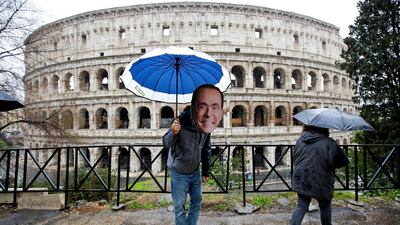Italy’s politicians have begun the long hard slog of coalition negotiations after Sunday’s general election left the country with a hung parliament.
While former premier Silvio Berlusconi had hoped to make his political comeback in 2018, that prospect was torpedoed when his supposedly junior coalition partner overtook him.
The far-right, anti-immigrant League party, headed by Matteo Salvini, took almost 18 per cent of the vote compared to the 14 per cent won by Mr Berlusconi's Forza Italia – a stinging personal defeat for the 81-year-old billionaire media mogul.
The right-wing coalition is short of an absolute majority but with 37 per cent, it is the leading bloc to emerge from the election and Mr Salvini has said it has the "right and the duty" to govern the country.
Mr Salvini has a deal with Mr Berlusconi that the party with the most votes gets to flag a candidate for the premiership to President Sergio Mattarella. Following his party’s stronger-than-expected showing in the election, Mr Salvini has signalled he’ll point to himself, which has led many to predict that Mr Berlusconi’s days at the helm of Italian politics are finally numbered.
"Berlusconi confirms that in politics there is only one sure thing: soon or late everybody loses," Filippo Taddei, professor of international finance at SAIS Johns Hopkins University, told The National.
“After this election, he lost the leadership of the centre-right for good. It was about time and he endured longer than anybody else but he lost nonetheless.”
_______________
Read more:
Far-right, populist surge leaves Italy in limbo
Italians head to polls after bitter campaign
Italy’s maverick populists top the polls as voting day arrives
Italy’s 31- and 81-year old political rivals woo mainstream voters
_______________
Others suggest Mr Berlusconi may still hang around longer than expected.
"It is too early to tell whether this is the end of Berlusconi's career, but it's obvious that he will not be around forever," Adriano Bosoni, senior Europe analyst for global intelligence firm Stratfor, told The National.
“In the coming months, the League will try to absorb Forza Italia and become the main representative of the Italian right. The question is whether this would lead to a more moderate League that manages to attract centrist voters, or to the emergence of a new, post-Berlusconi conservative party that competes for the moderate electorate."
The other major loser from Sunday’s election was Matteo Renzi, another former premier and leader of the ruling Democratic Party, whose centre-left coalition picked up just under 23 per cent of the vote.
On Monday, Mr Renzi said he would quit, but only after a new government is formed. He also insisted that the party would "not be a crutch for anti-system forces".
That statement has angered those within the Democratic Party who are open to the prospect of an alliance with the anti-establishment 5-Star Movement. The populist 5-Star, led by 31-year-old Luigi Di Maio, was by far the highest vote-getter of any single party in the election, as it drew on support from Italians frustrated with the listless economy and fed up of traditional parties.
"In order to cling on, [Mr Renzi] is willing to stall the political system," said Michele Emiliano, governor of the Puglia region and a leading Democratic Party member.
Despite previously ruling out forming alliances, Mr Di Maio has now pronounced he feels "the responsibility to form a government for Italy" and would be open to discussions.
A populist pact between 5-Star and the League has been described as the “nightmare scenario” for Europe. Whether this happens depends largely on how much Mr Di Maio is willing to give.
_______________
Read more:
Italy’s Berlusconi seduces voters in final bid for power
Italy prepares for March election with voters gloomy about future prospects
Party's rise puts Berlusconi's mansion back in spotlight
_______________
He said before the vote that he would offer a “government contract” - a deal short of a coalition - insist on being premier, and refuse to share out ministerial jobs.
If Mr Di Maio doesn’t change his tune, he’ll have a hard time making friends. Moreover, Mr Salvini has so far ruled out any partnership, stating: "N.O. No, underlined three times."
Another potential is a pro-European alliance based on the Democratic Party, its allies and Forza Italia. Before the election, this was seen as the best hope of investors and the EU. However, the underperformance of both the mainstream parties in the vote has reduced the likelihood of such an outcome.
Finally, there could be a stalemate if no clear majority emerges. In this scenario, President Mattarella could choose to leave in place the current centre-left government of Prime Minister Paolo Gentiloni.
This would allow time to set up a temporary government to reform the electoral law and organise new elections.
But the process would take time as consultations could only start after parliament's newly-elected lawmakers meet for the first time on March 23 to elect speakers of the two houses of parliament.
After a stalemate following Italy's last election in 2013, it took more than two months to form a government.

